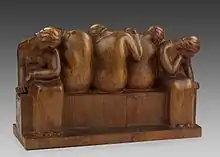Eugene Kormendi
Eugene Kormendi (1889–1959)[1] was a Hungarian sculptor. He studied at the Academy of Budapest before moving to Paris to collaborate with Auguste Rodin and Jean Paul Lorenz. Kormendi first came to the United States in 1939 along with his wife, Elizabeth, to attend the New York World's fair. The outbreak of World War I prevented him from returning to Europe, hence he stayed in the United States to pursue his career.[2] Starting in 1947, he was sculptor in residence at the University of Notre Dame until the end of his career.
Eugene Kormendi | |
|---|---|
 "Figure Group" on display at the Smithsonian American Art Museum | |
| Born | October 16th 1889 |
| Died | August 14th 1959 |
| Nationality | Hungarian |
| Education | Academy of Budapest |
| Known for | Sculpture |
List of Works
- Turkish Hungarian monument, Jászberény, 1909,[3]
- 0 kilométerkő Madonna, Budapest, 1932 (destroyed during World War II)[4]
- Monument to Heroes who died in World War I, Geszt, 1937,[5]
- World War I memorial, Balassagyarmat, 1937
- University of Notre Dame[6]
- “St. Thomas More”, “Christ the King” - Notre Dame Law School
- "The Graduate” - Alumni Hall
- “Commodore Barry” - Dillon Hall
- “St. Joseph with Lilly” - Lyons Hall
- “St. Andrew” - Morrissey Hall
- “St. Christopher” - Rockne Memorial
- “The Good Shepherd”; “St. Raphael the Archangel” - St. Liam Hall Infirmary
- "Mother and Child", "Head of a young man", "Figure Group", "St. Francis of Assisi", Smithsonian American Art Museum[7]
- World War I memorial, Seven Dolors Shrine, Valparaiso, Indiana[8]
- Christ Light of the World, USCCB building, Washington DC,[9]
See also
- TKPAGE
References
- "Eugene Kormendi | Smithsonian American Art Museum".
- "Eugene Kormendi - Artist, Fine Art Prices, Auction Records for Eugene Kormendi". www.askart.com. Retrieved 5 November 2019.
- Tamás, Pál. "Török–magyar-emlékmű". www.kozterkep.hu (in Hungarian). Retrieved 5 November 2019.
- Tamás, Pál. "0 kilométerkő". www.kozterkep.hu (in Hungarian). Retrieved 5 November 2019.
- Tamás, Pál. "I. világháborúban elesett geszti hősök emlékműve". www.kozterkep.hu (in Hungarian). Retrieved 5 November 2019.
- Archives, Notre Dame (17 June 2011). "Campus Statue Project". Notre Dame Archives News & Notes. Retrieved 5 November 2019.
- "Eugene Kormendi". Smithsonian American Art Museum. Retrieved 5 November 2019.
- Rajtar, Steve (2015). War monuments, museums and library collections of 20th century conflicts : a directory of United States sites. McFarland. p. 81. ISBN 9781476612379.
- "Centennial moment: Christ, the Light of the World statue | Catholic News Live". catholicnewslive.com. Retrieved 5 November 2019.
External links
This article is issued from Wikipedia. The text is licensed under Creative Commons - Attribution - Sharealike. Additional terms may apply for the media files.